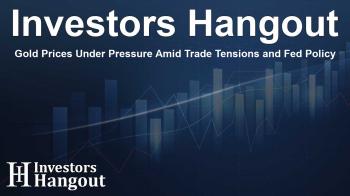Gold Prices Under Pressure Amid Trade Tensions and Fed Policy

Fed’s Caution Tempers Gold Investors’ Enthusiasm
Gold prices have seen a notable decline recently, falling over 1% due to the Federal Reserve's restrained dovish tone, which has tempered the enthusiasm of investors. The atmosphere is one of caution as market participants reassess the outlook for precious metals amidst a backdrop of changing monetary policy expectations.
With escalating trade tensions becoming a pressing issue, uncertainty continues to loom over the markets. The recent decision by U.S. officials has confirmed that upcoming tariffs will be enforced, further complicating global trade relations. Significant tariff increases on various products, including hefty rates on copper and pharmaceuticals, are anticipated to escalate tensions and impact interconnected supply chains.
In addition to these developments, the market’s expectations for interest rate cuts by the Fed have decreased, primarily driven by a robust U.S. jobs report from the previous week. The resilience shown in the labor market seems to suggest that the Fed may adopt a more cautious approach in the near future, which would reduce expectations for drastic monetary easing and impact gold's appeal.
As the price of gold stabilizes at approximately $3,300 during trading sessions, investors are keeping an eye on upcoming insights from the FOMC Meeting Minutes, which are set to be released today. This information could shed light on the central bank’s policy orientation amid the ongoing concerns over inflation and trade policy instability.
EU May Secure Exemptions from U.S. Trade Tariffs
In a related development, the euro has experienced a slight increase, rising 0.14% as markets adjust to the latest announcements regarding U.S. trade policy. Officials in the EU indicate that they might have successfully negotiated exemptions from certain newly imposed tariffs, which is expected to help stabilize trade flows between Europe and the United States.
President Trump has confirmed that tariffs affecting 14 countries are set to take effect soon, with implications that could influence transatlantic commerce. While the baseline tariff rate is increasing, the exemptions may help cushion market volatility and provide some relief to ongoing trade negotiations.
Moreover, with the strong measures in place, including high tariffs on copper and pharmaceuticals announced by Trump, the market is wary of how these trade policies may shape future economic narratives. Observers are looking to today's release of the FOMC Meeting Minutes, which may provide indicators of the Fed's stance and its possible impact on the euro.
RBA Interest Rate Decision Supports the Australian Dollar
The Australian dollar has shown resilience, appreciating by 0.61% as the Reserve Bank of Australia (RBA) opted to keep interest rates steady at 3.85%. This decision arrived amidst mixed expectations that previously pointed toward a potential rate cut and highlights the RBA's cautious outlook in a complicated economic environment.
Governor Michele Bullock emphasized the importance of monitoring inflation closely, as current inflationary pressures stemming from factors like high labor costs and productivity challenges remain significant. The RBA's meeting stressed the necessity for further evaluating economic conditions before making any policy adjustments.
The recent trade developments, where the timetable on tariffs was reiterated by U.S. President Trump, signal increased global trade tensions that the RBA is cautious of impacting economic growth and inflation metrics. These dynamics are essential for the Australian dollar to navigate, which has remained steady around 0.65300 while waiting for additional insights from policy meetings.
As investors reflect on the potential ramifications of the FOMC Meeting Minutes, the market sentiment toward interest rate movements remains pivotal. A hawkish tone from the Fed may exert downward pressure on the AUD/USD pair while a dovish outlook could bolster continuing upward momentum.
Frequently Asked Questions
What is causing the recent decline in gold prices?
The decline in gold prices has been driven by a cautious tone from the Federal Reserve and rising trade tensions, leading to reassessments in market sentiment.
How are trade tariffs affecting the economy?
Trade tariffs create uncertainty and can disrupt supply chains, increase costs for businesses and consumers, and lead to heightened global trade tensions.
What is the significance of the FOMC Meeting Minutes?
The FOMC Meeting Minutes provide insights into the Federal Reserve's monetary policy direction, which can influence investor expectations and market movements.
Why is the Australian dollar gaining strength?
The Australian dollar has strengthened due to the Reserve Bank of Australia's decision to maintain interest rates, indicating a cautious approach amid global economic changes.
What potential impacts do heightened tariffs have on commodities?
Increased tariffs can lead to higher commodity prices and volatility in market dynamics, affecting trade flows and inflation rates on a global scale.
About The Author
Contact Addison Perry privately here. Or send an email with ATTN: Addison Perry as the subject to contact@investorshangout.com.
About Investors Hangout
Investors Hangout is a leading online stock forum for financial discussion and learning, offering a wide range of free tools and resources. It draws in traders of all levels, who exchange market knowledge, investigate trading tactics, and keep an eye on industry developments in real time. Featuring financial articles, stock message boards, quotes, charts, company profiles, and live news updates. Through cooperative learning and a wealth of informational resources, it helps users from novices creating their first portfolios to experts honing their techniques. Join Investors Hangout today: https://investorshangout.com/
The content of this article is based on factual, publicly available information and does not represent legal, financial, or investment advice. Investors Hangout does not offer financial advice, and the author is not a licensed financial advisor. Consult a qualified advisor before making any financial or investment decisions based on this article. This article should not be considered advice to purchase, sell, or hold any securities or other investments. If any of the material provided here is inaccurate, please contact us for corrections.

